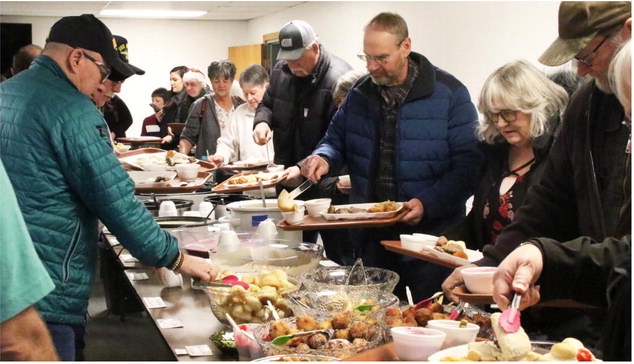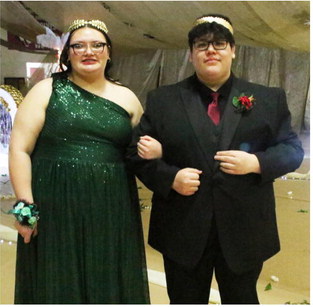Montana Freedom Caucus Launches With Rosendale As Its North Star
The mission of a freedom caucus, Montana congressman Matt Rosendale told state lawmakers in Helena Thursday evening, Jan. 19, can be defined by what it fights against.
“The radical left is trying to destroy our families, they’re trying to keep us from practicing our faith, and they’re trying to brainwash our children,” Rosendale said. “And it is really those three things that can encapsulate what we are all fighting.”
Rosendale emerged as one of the most prominent — and obstinate — members of the U.S. House Freedom Caucus, a coalition of hardline Republican lawmakers, during the protracted fight for the House speakership that gripped Congress earlier this month. Now, with assistance from Rosendale and a national organization called the State Freedom Caucus Network, the Montana Legislature is getting its own such group.
The Montana Freedom Caucus, chaired by Sen. Theresa Manzella, R-Hamilton, is a bloc of 14 named members — with more, she has said, who do not want to identify themselves — in both the state House and Senate who say they will present a unified, conservative front in Helena. The group announced its formation at the beginning of the session, and formally launched at an event in the state capital last week with Rosendale at the top of the bill.
“What you saw play out in Washington is what the power of a small group can do,” Rosendale said to a large crowd in the Capitol’s old Supreme Court chambers. “This freedom caucus is going to be … the tip of the spear.”
The caucus does not include any top legislative leaders, but does feature a smattering of whips, committee chairs and vice chairs, including Manzella, who chairs the Senate Highways and Transportation Committee.
In addition to Manzella and the named caucus members, a handful of other Republican lawmakers floated around the chamber, though whether they were there out of allegiance to the caucus’ mission or mere curiosity wasn’t clear. Sen. Wendy McKamey, R-Great Falls, generally regarded as a comparatively moderate member of the Republican caucus, briefly appeared, generating some chittering from the crowd. She had an invitation, she noted.
Unlike in Washington, D.C., where Republicans have a 10seat majority in the House and a minority in the Senate, the GOP has a vise grip on state government in Helena, with a bicameral legislative supermajority and Republicans holding every statewide office from the governorship on down. In the 2021 session, the Legislature, led by the state’s first Republican governor in 16 years, passed restrictions on abortion, tax cuts, an expansion of permitless carry and a litany of other conservative priorities. By all accounts, the 2023 session, with its even larger Republican majority, will look similar.
But Helena, Manzella said, has not moved far enough to the right. “Do you ever wonder why we send conservative majorities to Helena but we still seem to creep to the left?” she asked the audience. “We do too. That’s what we’re all about.”
For the new state Freedom Caucus to adopt an issue as a priority, 80 percent of its members must agree, Manzella said. On Thursday, the caucus announced five legislative priorities: judicial reform; spending down the state’s roughly $2 billion budget surplus in the form of tax rebates; parental rights, including school choice and “curriculum transparency”; election integrity; and preventing foreign nations from purchasing or controlling Montana land.
Already, those priorities are beginning to manifest in legislation. Rep. Jerry Schillinger, R-Circle, said the caucus has a bill in the works for a $1.25 billion tax rebate, a greater sum than in any other tax plan so far put forth by lawmakers or the governor’s office. Rosendale and caucus members also spoke of medical freedom, apparently using the phrase to reference vaccine skepticism rather than abortion access, a target of ire among the GOP’s right flank.
Sen. Barry Usher, R-Billings, the caucus’ treasurer, said he doesn’t believe “medical freedom” means access to abortion or medical care for transgender people, but noted that the caucus doesn’t have an official position.
“I believe that we have not discussed that and we have not taken votes on that, so as a caucus, I can’t say that we’re for or against that,” he told Montana Free Press in reference to abortion. “And I think you all know my position.”
The Montana Freedom Caucus got off the ground with a call last year from Rosendale to Manzella.
“I said, look, Montana needs a Freedom Caucus. We have these supermajorities in both chambers of the Republicans, but they need to have a smaller group that can be the unified voice, the organized, unified voice for the conservative movement,” Rosendale told reporters after the event.
Manzella assembled a list of potential members, and the national organization audited their voting records and personal backgrounds.
“They checked our voting records and they checked our backgrounds, because they do not want to be embarrassed by any skeletons in our closet, or people who might claim to be conservative but really aren’t,” Manzella said.
“Have you ever dealt with anyone like that?” she asked the audience, to laughter.
In December, the group went to Washington, D.C. to meet with Rosendale and the State Freedom Caucus Network for training. The network is an organization affiliated with the Congressional Freedom Caucus launched in late 2021. It’s led by Republican operative and former Club for Growth Executive Director Andy Roth and former House Freedom Caucus Executive Director Justin Ouimette. The chapter in Montana is one of a dozen state legislative caucuses across the country.
The group is also paying for a state director, Lewis and Clark County Republican Central Committee Chair Darin Gaub.
Usher said the possibility of a financial arrangement remains open. He solicited monetary pledges from the audience, and noted that the caucus could form a political action committee.
“If we become a PAC, you know, we’re going to need money, right? So I’ve already got two people that have said, ‘Yeah, we’re going to give money.”
As the Republican caucus in the Montana Legislature has grown, so too have its apparent divisions between hardline conservative ideologues and pragmatists willing to collaborate on bipartisan agendas. The formal creation of a voting bloc in the mold of a national caucus that’s made a name by sticking fingers in the eyes of Republican leadership could inflame that dynamic.
Rosendale said Thursday that party unity is secondary to the mission at hand.
“You can’t put the same people in office and use the same rules and think that you’re going to have a different outcome,” he said. “If you want change, you have to make change. When you’re taking power from someone, they will not relinquish it. You have to take it from them.”
In an interview last week, House Speaker Matt Regier, R-Kalispell, said he was not concerned about the creation of a new faction within the larger Republican caucus.
“My take here as leadership is I’ve got a caucus of 68 and that’s the Republican caucus,” Regier said. “There’s a sportsmen’s caucus, there’s the freedom caucus, there’s all sorts of different caucuses that have their own agendas and what they want to do for top priorities. But at the end of the day, we’ve got 68 Republicans out of 100 in the House here, and it’s going to take us 51 to pass a bill across the floor.”
In a statement this week, minority-party Democrats described members of the Montana Freedom Caucus as “extremists” intent on destroying Montana’s public institutions and eroding freedoms. They contrasted the small-government attitudes of the group with the fact that many of its members’ businesses benefited from federal subsidies and forgivable loans during the COVID-19 pandemic.

